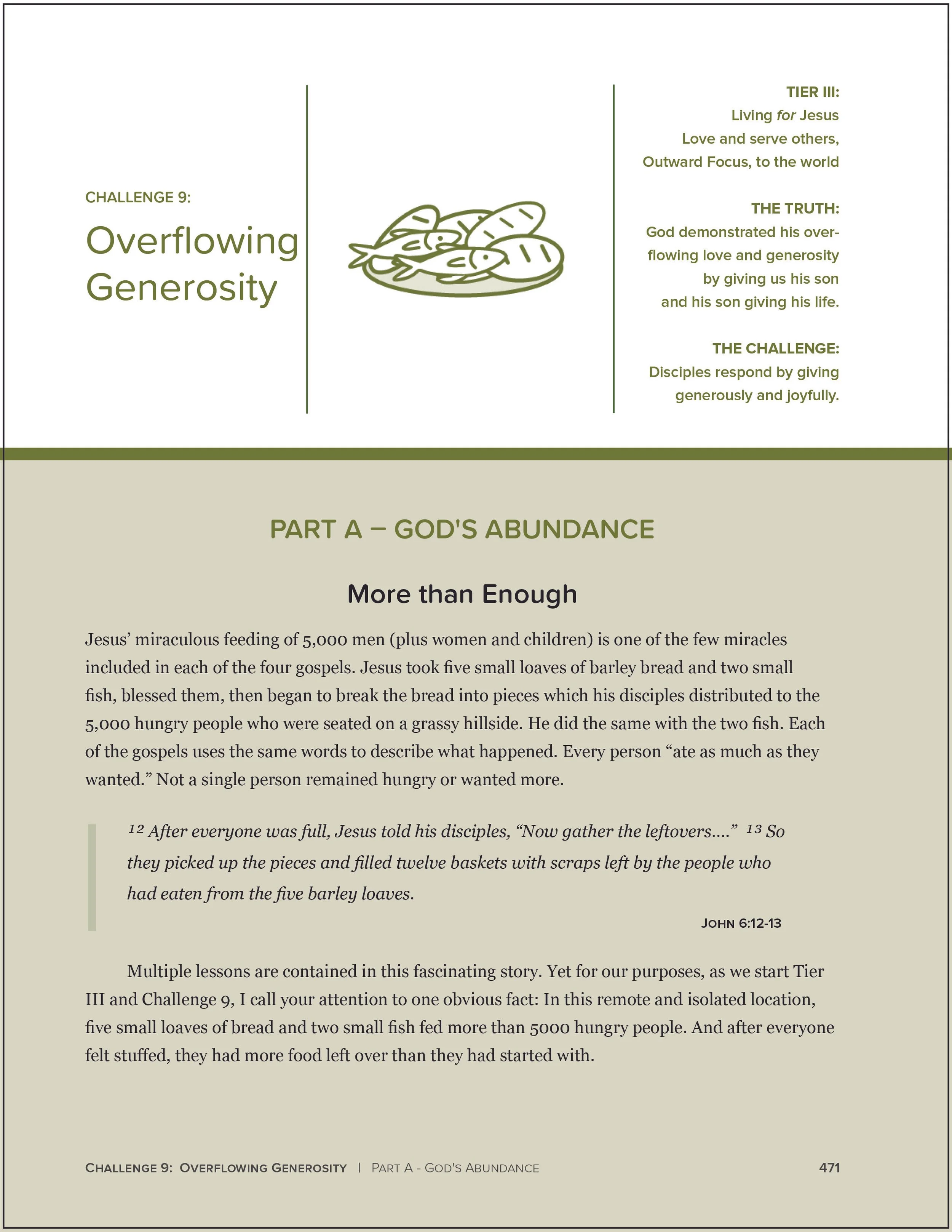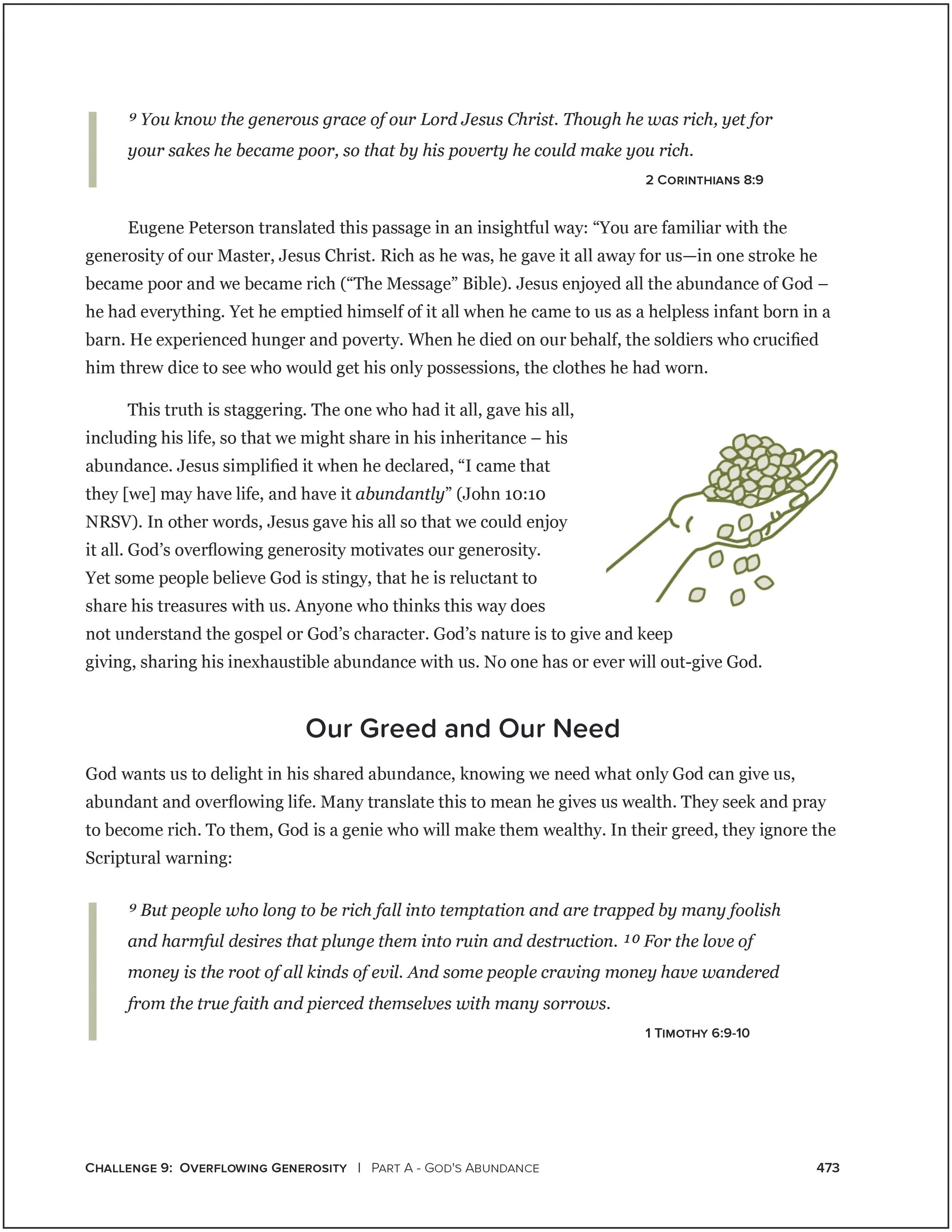CHALLENGE 9-A
All studies are available in
two formats:
Read the online version of Challenge 9, Part A below.
Or download the book formatted 8.5” x 11” version. You can print this version to keep in a binder as you progress through the study.
CHALLENGE 9: OVERFLOWING GENEROSITY
Part A - God’s Abundance
More than Enough
Jesus’ miraculous feeding of 5,000 men (plus women and children) is one of the few miracles included in each of the four gospels. Jesus took five small loaves of barley bread and two small fish, blessed them, then began to break the bread into pieces which his disciples distributed to the 5,000 hungry people who were seated on a grassy hillside. He did the same with the two fish. Each of the gospels uses the same words to describe what happened. Every person “ate as much as they wanted.” Not a single person remained hungry or wanted more.
¹² After everyone was full, Jesus told his disciples, “Now gather the leftovers….” ¹³ So they picked up the pieces and filled twelve baskets with scraps left by the people who had eaten from the five barley loaves.
John 6:12-13
Multiple lessons are contained in this fascinating story. Yet for our purposes, as we start Tier III and Challenge 9, I call your attention to one obvious fact: In this remote and isolated location, five small loaves of bread and two small fish fed more than 5000 hungry people. And after everyone felt stuffed, they had more food left over than they had started with.
This is a remarkable story and a jaw-dropping miracle. It points us to God’s bountiful provision (God’s providence). The kingdom of God (wherever Jesus is recognized as King) is characterized by abundance. God does not lack resources. In fact, God’s resources are not only abundant and plentiful; they are inexhaustible! They can no more be exhausted than one can drain the oceans by standing on the beach and scooping out seawater one cup at a time. The One who created all that is, the entire universe, is not a God of scarcity, but a God of abundance. Feeding 5,000 hungry people barely begins to describe God’s abundance. This is gospel truth.
In the Old Testament God promised Abraham that he would give his descendants a land. This “promised land” was described as a land “flowing with milk and honey”:
¹⁷ “And I have promised to bring you up out of your misery in Egypt into the land of the Canaanites, Hittites, Amorites, Perizzites, Hivites and Jebusites—a land flowing with milk and honey.”
Exodus 3:17
The description of the promised land as flowing with milk and honey reoccurs at least 24 times in the OT. It is a poetic description of a rich and fertile land that produces an abundance of fruit, grain, and livestock. Abraham’s descendants had experienced only scarcity during their 400 years of slavery in Egypt as they longed for the abundance God had promised. They had been aliens and slaves and desired freedom in their own land. For an agrarian and oppressed people, a land flowing with milk and honey was a description of paradise.
God’s Generosity
God is a God of abundance. That is the starting point for Step 9. But God is also a God of overflowing generosity. God loves to freely give life-enhancing gifts. By nature, God shares his abundance with us. The gospel both demonstrates and reveals God’s generosity. Challenge 9 declares that God gave us what was most precious to him—his Son—and his Son gave his life for us. God continues to give his best, his priceless gifts of life and love. We deserve his condemnation, but he gives us unconditional love, forgiveness, and grace. Paul describes his overflowing generosity with these words:
⁹ You know the generous grace of our Lord Jesus Christ. Though he was rich, yet for your sakes he became poor, so that by his poverty he could make you rich.
2 Corinthians 8:9
Eugene Peterson translated this passage in an insightful way: “You are familiar with the generosity of our Master, Jesus Christ. Rich as he was, he gave it all away for us—in one stroke he became poor and we became rich (“The Message” Bible). Jesus enjoyed all the abundance of God – he had everything. Yet he emptied himself of it all when he came to us as a helpless infant born in a barn. He experienced hunger and poverty. When he died on our behalf, the soldiers who crucified him threw dice to see who would get his only possessions, the clothes he had worn.
This truth is staggering. The one who had it all, gave his all, including his life, so that we might share in his inheritance – his abundance. Jesus simplified it when he declared, “I came that they [we] may have life, and have it abundantly” (John 10:10 NRSV). In other words, Jesus gave his all so that we could enjoy it all. God’s overflowing generosity motivates our generosity. Yet some people believe God is stingy, that he is reluctant to share his treasures with us. Anyone who thinks this way does not understand the gospel or God’s character. God’s nature is to give and keep giving, sharing his inexhaustible abundance with us. No one has or ever will out-give God.
Our Greed and Our Need
God wants us to delight in his shared abundance, knowing we need what only God can give us, abundant and overflowing life. Many translate this to mean he gives us wealth. They seek and pray to become rich. To them, God is a genie who will make them wealthy. In their greed, they ignore the Scriptural warning:
⁹ But people who long to be rich fall into temptation and are trapped by many foolish and harmful desires that plunge them into ruin and destruction. ¹⁰ For the love of money is the root of all kinds of evil. And some people craving money have wandered from the true faith and pierced themselves with many sorrows.
1 Timothy 6:9-10
Jesus taught his disciples to pray, “Give us today the food we need” (Matthew 6:11), the first petition in the Lord’s prayer. We are invited to ask God to provide for our needs each day. The Israelites spent forty years in the desert and each day God provided them with manna from heaven. If they collected extra manna for the next day it would rot. Like them, he wants us to walk by faith, trusting God to provide for our needs each day. Or as 2 Corinthians 5:7 literally says, “We walk by faith, not by sight.” Disciples live one day at a time, trusting God to meet our needs as they arise, not in advance.
To be given wealth can mean that we do not need to trust God for our daily needs. We would have the resources to not only pay for the food we need for today, but for tomorrow, next month and far into the future as well. Jesus said, “Seek the Kingdom of God above all else, and live righteously and he will give you everything you need” (Matthew 6:33). Perhaps the wisdom of Proverbs brings further clarity.
⁸ … give me neither poverty nor riches!
Give me just enough to satisfy my needs.⁹ For if I grow rich, I may deny you and say, “Who is the LORD?”
And if I am too poor, I may steal and … insult God’s holy name.
Proverbs 30:8-9
Instead of focusing on seeking God’s help in amassing wealth, disciples focus on following God’s example of exhibiting overflowing generosity. If we are given significant wealth, we bear the responsibility of managing it in ways that honor God by sharing the blessings with others. Whether in plenty or in want, disciples seek to share with others what God has shared with them. We seek to “honor the LORD with our wealth” (Proverbs 3:9). Jesus made this clear when he said, “It is more blessed to give than to receive” (Acts 20:35).
Disciples intentionally express our faith and love through extravagant and overflowing generosity, not by amassing wealth. We are called to be the most generous people in the world. This pleases the Lord and blesses us as much or more than it blesses those who are the recipients of our generosity. It’s an investment, a way to “store up for ourselves treasures in heaven” (Matthew 6:20). We give our love, our money, our time, and our best freely, cheerfully, and joyfully. We need to give as much as others need to receive what we give. Generosity is a necessary and essential responsibility for citizens in God’s eternal Kingdom. Jesus was a giver, not a taker, and so are his apprentices in Kingdom living.
THINKING IT THROUGH
“I used to wander off until you disciplined me, but now I closely follow your word.” (Ps 119:67)
THE TRUTH: God demonstrated his overflowing love and generosity by giving us his son and his son giving his life.
YOUR CHALLENGE: Disciples respond by giving generously and joyfully.
The Scriptures and questions, are for group discussion and personal reflection. Tier III is about our purpose in life. As disciples we live for something greater than ourselves. We live for Jesus. Like Jesus, our focus is outward toward the world, the needs of others, and making the world a better place. The questions can help you understand this challenge at a deeper level. You are encouraged to focus on those questions that you find most interesting or helpful. This is not a test, but a tool to help you work the challenges.
Related Scriptures
Matthew 10:8 ⁸ …. Give as freely as you have received!
Matthew 19:27 ²⁷ Then Peter said to him, “We’ve given up everything to follow you. What will we get?”
Luke 6:30 ³⁰ Give to anyone who asks; and when things are taken away from you, don’t try to get them back.
Luke 12:32 ³² “So don’t be afraid, little flock. For it gives your Father great happiness to give you the Kingdom.”
Luke 12:33 ³³ “Sell your possessions and give to those in need. This will store up treasure for you in heaven! And the purses of heaven never get old or develop holes. Your treasure will be safe; no thief can steal it and no moth can destroy it.”
Acts 3:6 ⁶ But Peter said, “I don’t have any silver or gold for you. But I’ll give you what I have. In the name of Jesus Christ the Nazarene, get up and walk!”
Romans 8:3 ³² Since he did not spare even his own Son but gave him up for us all, won’t he also give us everything else?
Romans 10:2 ¹² Jew and Gentile are the same in this respect. They have the same Lord, who gives generously
2 Corinthians 6:10 ¹⁰ Our hearts ache, but we always have joy. We are poor, but we give spiritual riches to others. We own nothing, and yet we have everything.
Ephesians 1:14 ¹⁴ The Spirit is God’s guarantee that he will give us the inheritance he promised and that he has purchased us to be his own people. He did this so we would praise and glorify him.
Philippians 4:19 ¹⁹ And this same God who takes care of me will supply all your needs from his glorious riches, which have been given to us in Christ Jesus.
Colossians 3:24 ²⁴ Remember that the Lord will give you an inheritance as your reward, and that the Master you are serving is Christ.
1 Timothy 6:17 ¹⁷ Teach those who are rich in this world not to be proud and not to trust in their money, which is so unreliable. Their trust should be in God, who richly gives us all we need for our enjoyment.
2 Peter 1:3-4 ³ By his divine power, God has given us everything we need for living a godly life. We have received all of this by coming to know him, the one who called us to himself by means of his marvelous glory and excellence. ⁴ And because of his glory and excellence, he has given us great and precious promises. These are the promises that enable you to share his divine nature and escape the world’s corruption caused by human desires.
John 3:27 [John the Baptist] ²⁷ “No one can receive anything unless God gives it from heaven.”
Questions
You are encouraged to use these questions for group discussion or personal reflection. Respond to the questions that are most relevant or interesting to you (I urge you to write your responses in a journal or notebook).
Write a paragraph describing the clearest expression of overflowing generosity you have witnessed or experienced.
Identify a passage that speaks to you of either God’s abundance or his generosity and explain why you chose that passage.
What prevents you from becoming a more generous disciple?
How do you understand the relationship between generosity, grace, and gratitude?
Share an experience where you gave sacrificially, and it brought you a deep sense of joy and fulfillment.
Reflect on the first church in Jerusalem and describe the role generosity played in that first-century community of faith.
Jesus challenged his disciples, “Seek the Kingdom of God above all else, and live righteously, and he will give you everything you need.” (Matt 6:33). Clarify both the challenge and the promise that this verse contains.
Read and reflect on Proverbs 30:8-9 (below). Either paraphrase it in your own words or explain why or why not you could make this passage your own prayer.
Proverbs 30:8-9
⁸ … give me neither poverty nor riches!
Give me just enough to satisfy my needs.
⁹ For if I grow rich, I may deny you and say, “Who is the LORD?”
And if I am too poor, I may steal and … insult God’s holy name.
Copyright © 2024 Don Waite
All rights reserved.



